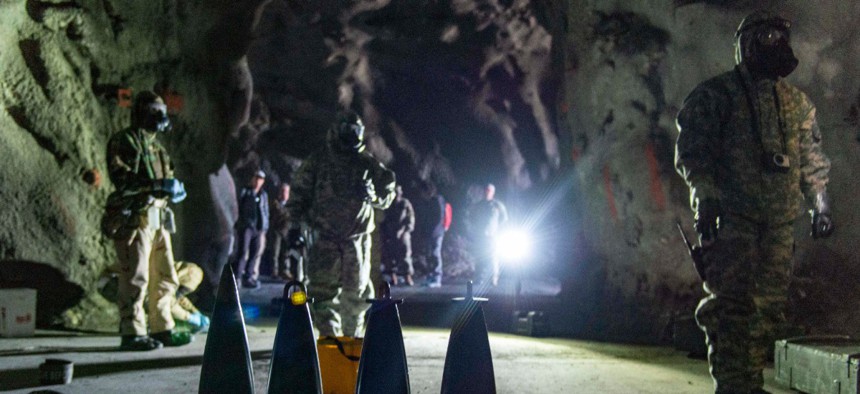Pentagon Looks into Virtual Reality to Prepare Troops for Nuclear War

Scientists watch soldiers sample simulated leaking chemical weapons in an underground facility in order to get a better idea of both the bulky protective gear soldiers must wear as well as the dark, constrained environments they sometimes work in. Becki Bryant/Defense Department
The tech would let troops run through more exercises more frequently and at less cost than traditional training in the real world.
The Defense Department is considering investing in virtual reality platforms to prepare troops to face nuclear threats.
The Defense Threat Reduction Agency on Tuesday began seeking information on virtual reality training systems that would allow troops to rehearse different scenarios involving “radiological threats.”
The agency, which focuses on countering weapons of mass destruction, could one day use the tech to train troops to intercept radiological weapons on the battlefield, respond to radioactive contamination and even prepare for full-fledged nuclear war, officials wrote in the solicitation.
While virtual and augmented platforms wouldn’t entirely replace the agency’s current training regimen, they would expose troops to more training exercises than they could ever experience in the real world. Physical training is expensive and time-consuming, but through virtual reality, troops could run through more exercises more frequently and at a lower cost.
Under the solicitation, officials are looking for industry to outline their own virtual reality platforms, the hardware required to use them and how environments can be modified to accommodate new exercises.
Officials plan to use the information collected under the solicitation to inform potential future acquisitions. Responses are due Aug. 12.
This wouldn’t be the first time the Pentagon turned to virtual platforms to train troops for real-world scenarios.
Last year, Microsoft won a $480 million contract with the Army to adapt its HoloLens augmented reality headsets for use in military training and combat operations. The headsets would be outfitted with artificial intelligence and machine-learning capabilities, and provide troops with “increased lethality, mobility, and situational awareness.”
In February, Microsoft employees wrote a letter to executives demanding the company pull out of the contract, saying they “refuse to create technology for warfare and oppression.” The company opted to stand by its partnership with the Pentagon.
NEXT STORY: SEC Wants a Subscription for Blockchain Data



